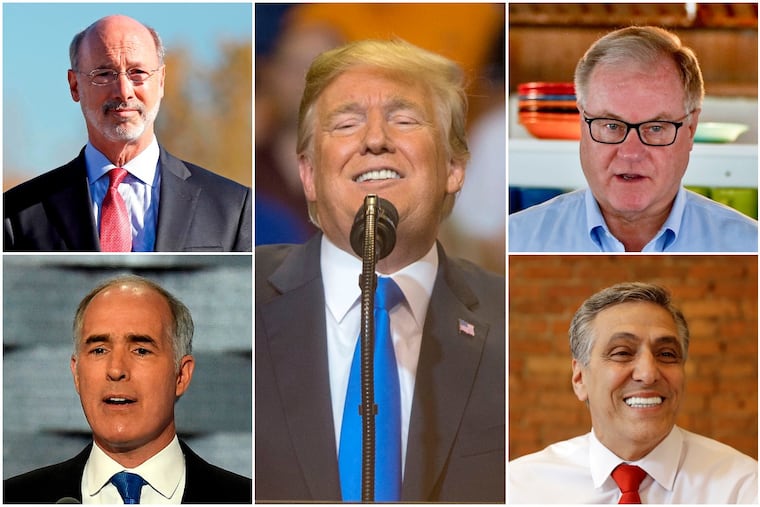Trump’s unpopularity, Democratic voter enthusiasm drive leads for Wolf, Casey in new Pa. poll
President Trump's unpopularity among Pennsylvania voters and Democratic Party enthusiasm for the Nov. 6 general election help give Gov. Wolf and U.S. Sen. Bob Casey Jr. double-digit leads in reelection bids over Republican challengers.

President Trump and political polarization are not on the Nov. 6 general election ballot in Pennsylvania, but a new Franklin and Marshall College Poll shows they factor significantly into the thinking of likely voters.
A pair of Democrats seeking reelection, Gov. Wolf and U.S. Sen. Bob Casey, appear to be beneficiaries of their party's electoral enthusiasm, driven in large part by the president's unpopularity.
"One of the motivating features is the antipathy and opposition to President Trump," poll director G. Terry Madonna said.
Wolf and Casey hold double-digit leads, but that doesn't mean they're wildly popular. Rather, it reflects a lack of voter knowledge about the Republican challengers — former State Sen. Scott Wagner for Wolf, U.S. Rep. Lou Barletta for Casey.
There is far less ambiguity about Trump in the poll: 57 percent have a unfavorable view of the president, 39 percent have a favorable view, and just 4 percent are undecided.
And that could have an impact on down-ballot races, especially for seats in the House. Pennsylvania has several competitive races that could figure in which party controls the chamber.
Democrats had a higher enthusiasm level, with 60 percent saying they're "very interested" in voting, compared with 53 percent of Republicans and 33 percent of independents. High interest is considered a predictor of election turnout.
Forty-eight percent of the voters in the poll said they are supporting a Democrat for the House in November, while 39 percent said they favor a Republican; 13 percent were undecided.
Two out of three voters intending to vote for a Democrat — 67 percent — said they were motivated by opposition to Trump and the Republicans who control Congress. Three out of four — 74 percent — of those planning to vote Republican said they wanted to support the president and the party's congressional majorities.
By contrast, the races for governor and for the U.S. Senate elicit less emotion.
Forty-eight percent of the voters in the poll had a favorable view of Wolf, who is seeking a second term, while 36 percent had an unfavorable view, and 16 percent were undecided.
Nearly a majority, 49 percent, were undecided or didn't know enough to offer an opinion on Wagner, while 21 percent had favorable opinions, and 30 percent unfavorable opinions.
That left Wolf with a 17-point lead over Wagner, 52 percent to 35 percent, among likely voters. Nominees for the Libertarian Party, Ken Krawchuk, and Green Party, Paul Glover, barely registered at 2 percent each.
Barletta continues to be the least known major-party candidate on the statewide ballot with 68 days until the election. Fifty-eight percent of the voters in the poll were undecided or had no opinion on Barletta, while 20 percent had a favorable view, and 22 percent had an unfavorable view.
Casey, who is seeking a third term, was viewed favorably by 42 percent, while 29 percent saw him in an unfavorable light, and 29 percent were undecided or had no opinion.
That left Casey with a 13-point lead over Barletta among likely voters, 47 percent to 34 percent. Libertarian Party nominee Dale Kerns and Green Party nominee Neal Gale each ranked at 1 percent.
Madonna said voter attitudes could shift with effective television ad campaigns.
"We live in a huge state," Madonna said. "It takes a considerable amount of money in the media, particularly in television, to make your mark. As I always say, it's nothing a million dollars won't change."
A super-majority believes that Russia interfered in the 2016 election, which led to an investigation that haunts Trump's administration. Sixty-seven percent of those polled agreed that Moscow meddled, while 22 percent said it did not, and 11 percent said they did not know.
The poll's findings are in line with averages of public polls compiled by the website Real Clear Politics, which gives Wolf a 15.5 percent lead over Wagner and Casey a 15.7 percent lead over Barletta.
The poll of 511 registered voters — 243 Democrats, 200 Republicans, and 68 independents — was conducted from Aug. 20 to 26 and had a margin of error of 6.1 percent. That sample by percentage roughly matches the breakdown of Pennsylvania registered voters by party, according to statistics available from the Department of State as of Monday.